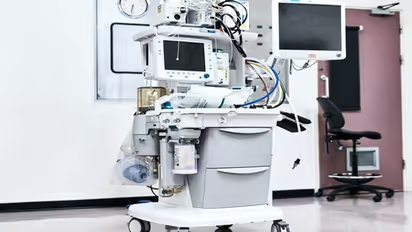Coronavirus: 96% of 60,000 ventilators being procured are indigenous, says health ministry

Synopsis
The Union health ministry on Tuesday (August 4) said about 96% of the 60,000 ventilators being procured by the government are indigenous and most of them have been sponsored by the PMCARES fund.
New Delhi: The Union health ministry on August 3, said about 96% of the 60,000 ventilators being procured by the government are indigenous and most of them have been sponsored by the PMCARES fund. Health ministry secretary Rajesh Bhushan said 60,000 ventilators are being procured and 18,000 have already been supplied to the states and union territories.
"Of the 60,000 ventilators, 50,000 are being funded by PMCARES fund which comes to about Rs 2,000 crore in monetary terms," Bhushan said during a press briefing. He further said all the ventilators that are being procured under PMCARES and those by the budgetary allocation of the health ministry have GPS chips embedded that can be tracked.
"The 'Make in India' (indigenous) ventilators have a share of more than 96% by volume and more than 90% by value," he said. Responding to a question on whether some ventilators of AgVa brand were rejected, Bhushan said those ventilators are of a different make than the ones the government is procuring.
"The news that we have seen in the media about AgVA ventilators being rejected is in relation to two specific hospitals in the Bombay Municipal area. Those ventilators are of a different make than the one that we are procuring and another fact is that those ventilators were donated to those specific hospitals in Mumbai by an NGO and these ventilators are being used by Maharashtra and they have not complained about it," he said.
Bhushan said as of Monday only 0.27% of the total active cases of coronavirus were on ventilators across the country. "Yesterday, only 0.27% of the total active cases were on ventilators across the country. I am not saying the situation will remain the same but in the last six months ventilator need percentage has not reached at 1% in case of patients using ventilatory support," he said.
Noting that initially the domestic capacity of making ventilators was insignificant, the official said domestic manufacturers were dependent upon imported components like sensors (oxygen, airflow and pressure sensors), stepper motor drive, pressure transducer, control valves, turbines etc.
The Indian ventilator market in 2019 was 8,510 units valued at Rs 444.74 crore annually in terms of volume and value and 75% of market share was with the imported equipment. In March, 2020 because of COVID-19 the demand for ventilators spiked and export restrictions were imposed in many ventilator-producing countries like Argentina, Germany, USA, Switzerland.
He said to meet the demand of ventilators in view of the coronavirus outbreak, the Committee of Technical Experts under DGHS met multiple times to deliberate with subject experts and then prescribed minimum essential specifications for the basic ventilators to be procured for COVID-19 purposes.
"Orders were placed based on the recommendations of the Technical Committee of domain experts under DGHS (Directorate General of Health Services) and ventilators were physically demonstrated before the same committee," he told reporters.
After the ventilator model qualified the demonstration, it was validated clinically on patients in a hospital as decided by the DGHS, he said, adding, after successful clinical validation and based on the specific recommendation of DGHS, the ventilator was approved for supply.
"This is the story of 'Make in India' ventilators and its price ranges between Rs. 1.5 lakh to Rs. 4 lakh per unit while the price of foreign ventilators range from Rs 10 lakhs to 20 lakhs," he noted.
He further said two public sector units played a crucial role in the ventilators being manufactured indigenously -- Bharat Electronics Limited (BEL) which is a PSE of Ministry of Defence (30,000 ventilators) and Andhra Med-Tech Zone (AMTZ) which is a PSE of AP government (13,500 Ventilators).
He said in less than two months more than 18,000 ventilators were supplied to states, UT's, central government hospitals and DRDO facilities and ventilators were installed at more than 700 hospitals.
The monitoring of these ventilators is being done through a dashboard that can track real time status of ventilators dispatched, delivered and installed, he added.
"Institution wise tracking has also been enabled and each ventilator is Geo tagged to track their location. We have also created 36 Whatsapp groups and every state has a Whatsapp group to give feedback in real time basis to suppliers," he said.
(With inputs from PTI)